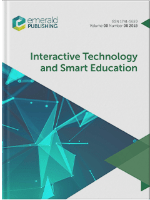
Interactive Technology and Smart Education
Scope & Guideline
Advancing knowledge in the realm of interactive learning.
Introduction
Aims and Scopes
- Integration of Technology in Education:
Exploring how various technological tools, such as AI, AR, and gamification, enhance learning experiences and outcomes in educational settings. - Innovative Learning Methods:
Researching new pedagogical approaches, including blended learning, flipped classrooms, and experiential learning, that utilize technology to foster student engagement and achievement. - Impact of Digital Tools on Learning:
Analyzing the effects of digital tools and platforms on student motivation, self-regulation, and cognitive processes within different educational contexts. - Teacher Perspectives and Professional Development:
Investigating educators' views on technology integration, their readiness for digital teaching, and the professional development needed to effectively use technology in the classroom. - Educational Equity and Accessibility:
Addressing issues of digital divide and exploring how technology can promote inclusive education and support diverse learners.
Trending and Emerging
- Artificial Intelligence in Education:
Research on the application of AI tools, such as ChatGPT, in educational settings is rapidly increasing, focusing on their integration, effectiveness, and implications for teaching and learning. - Metaverse and Virtual Learning Environments:
The exploration of metaverse applications and virtual reality in education is gaining traction, driven by the need for immersive and interactive learning experiences. - Gamification with Personalization:
There is a growing emphasis on personalized gamification approaches that cater to individual learning styles and preferences, enhancing engagement and educational outcomes. - Collaborative and Hybrid Learning Models:
Research into collaborative learning strategies, especially in hybrid and remote settings, is emerging as educators seek effective ways to foster interaction and engagement among diverse learners. - Impact of COVID-19 on Educational Practices:
The ongoing analysis of how the pandemic has transformed teaching and learning practices continues to be a key theme, focusing on lessons learned and future implications for digital education.
Declining or Waning
- Traditional E-Learning Models:
Research on conventional e-learning approaches has decreased as newer, more interactive methods gain attention, reflecting a shift towards exploring innovative, hybrid, and immersive learning environments. - General Technology Adoption Studies:
Studies that merely focus on the adoption of technology without examining specific educational outcomes or pedagogical implications are becoming less frequent, as the field moves towards more nuanced analyses. - Basic Gamification Techniques:
While gamification remains relevant, there is a noticeable decline in studies focusing solely on basic gamification strategies, with a preference now for exploring more complex and integrative approaches. - Static Learning Environments:
Research related to traditional, non-interactive learning environments is fading, as the focus shifts to dynamic, personalized, and technology-enhanced learning experiences. - General Overviews of Educational Technology:
Broad reviews of educational technology's impact are less common, with more emphasis placed on specific case studies and empirical research that provide deeper insights into particular technologies and their educational implications.
Similar Journals
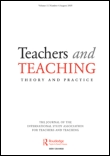
Teachers and Teaching
Exploring the Dynamics of Teaching and LearningTeachers and Teaching is a premier scholarly journal published by Routledge Journals, Taylor & Francis Ltd, providing an essential platform for researchers, educators, and practitioners in the fields of Education and Arts and Humanities. With an editorial focus on the dynamics of teaching and learning, the journal aims to share innovative research and insightful discussions that enhance pedagogical practices and policy development. Notably, it has achieved a Q1 ranking in both the Arts and Humanities and Education categories, signifying its impact and relevance in educational research, as reflected in its Scopus rankings, with an 84th percentile for Arts and Humanities and a 76th percentile in Education. Although it does not offer open access, the journal provides extensive access options for libraries and institutions, making its rich content available to a wide audience. Spanning from 1995 to 2024, Teachers and Teaching continues to set the standard for high-quality scholarship in the evolving landscape of education, inviting contributions that explore challenges and innovations in teaching methodologies.

E-Learning and Digital Media
Unlocking the potential of e-learning for all.E-Learning and Digital Media, published by SAGE Publications Inc, is a premier academic journal dedicated to the innovative intersection of digital technologies and education. With a strong commitment to advancing research in the fields of education and computer science, this journal has established itself as a vital resource for researchers, professionals, and students alike. As of 2023, it proudly holds a Q2 ranking in both Computer Science Applications and Education, reflecting its impact and reach within the academic community. The journal encompasses a wide range of topics exploring the effectiveness and applications of e-learning technologies, pedagogical strategies, and digital media in educational settings. Since its inception in 2009, E-Learning and Digital Media has continuously contributed to the understanding and development of digital education, ensuring relevancy in an ever-evolving landscape. With an open access model intended to foster accessibility and dissemination of knowledge, this journal invites submissions that push the boundaries of traditional education through cutting-edge research and practice.

Pegem Egitim ve Ogretim Dergisi
Illuminating Contemporary Practices in EducationPegem Egitim ve Ogretim Dergisi is a prominent academic journal published by PEGEM AKAD YAYINCILIK EGITIM DANISMANLIK HIZMETLERI TIC LTD STI, specializing in the field of education. Based in Turkey, this journal offers a platform for scholarly discourse, catering to both emerging and established researchers in the educational domain. With its ISSN 2148-239X, the journal aims to provide insights into contemporary educational practices, pedagogical innovations, and research findings that influence teaching and learning. Although classified in the Q4 quartile of the education category as of 2022 and achieving a Scopus rank of 1178 out of 1469, it remains a valuable resource for practitioners and academics alike. The journal ceased Scopus coverage in 2023, yet it continues to be a relevant outlet for educational research in Turkey and beyond. While it operates under traditional access models, the potential for collaborative research and knowledge sharing makes it a noteworthy choice for those engaged in the evolving landscape of education.

Journal of Computers in Education
Advancing Knowledge at the Intersection of Tech and Teaching.The Journal of Computers in Education is a distinguished academic journal published by SPRINGER HEIDELBERG, dedicated to advancing the intersection of technology and pedagogy. With an ISSN of 2197-9987, this journal has established itself as a pivotal resource for researchers and educators alike since its inception in 2019, maintaining a strong focus on innovative applications of computer science within educational contexts. Ranked in the Q1 category in both Computer Science Applications and Education, the journal demonstrates a high impact in its field, holding a remarkable position within the top 1.5% of journals in social sciences (rank #20/1543) and top 5.5% in computer science applications (rank #45/817). The journal's scope encompasses a wide range of topics including but not limited to educational technologies, e-learning methodologies, and the effective integration of computers in teaching, making it an essential source for professionals and students who are keen to explore cutting-edge research and trends. Although access options vary, the journal's commitment to disseminating quality research continues to enrich the academic landscape in Germany and beyond, nurturing the synergies between education and technology.
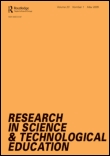
Research in Science & Technological Education
Pioneering Research for a New Era in STEM EducationResearch in Science & Technological Education, published by Routledge Journals, Taylor & Francis Ltd, is a leading international journal dedicated to advancing the field of education within the realms of science and technology. With its ISSN 0263-5143 and E-ISSN 1470-1138, this prestigious journal provides a platform for innovative and rigorous research from 1983 to the present, thus offering critical insights into pedagogical practices, curriculum development, and policy-making. Boasting a remarkable impact, it ranks in the top quartile (Q1) in both Education and Multidisciplinary categories as of 2023, with an impressive Scopus ranking of #270 out of 1543 in Social Sciences _ Education, placing it in the 82nd percentile. Researchers, educators, and students will find invaluable resources and discussions that shape the future of science and technological education in an increasingly complex world. Although this journal does not offer Open Access, it maintains a strong commitment to disseminating high-quality research, making it an essential read for those invested in the evolution of educational practices and outcomes in the STEM fields.
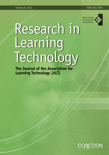
Research in Learning Technology
Fostering Global Collaboration in Learning Technology ResearchResearch in Learning Technology, published by the Association for Learning Technology (ALT)impact factor, the journal has consistently ranked in the top quartiles of both the Education (Q1) and Computer Science Applications (Q2) categories as of 2023, highlighting its significance and influence in the academic community. The journal is committed to disseminating high-quality research and practical insights that bridge the gap between technology and pedagogy, making it an essential resource for researchers, educators, and practitioners alike. The Scopus rankings further emphasize its reputation, placing it in the top 10% of social sciences education journals. As an open-access journal, Research in Learning Technology ensures that its valuable content is freely accessible, empowering a global audience to drive innovation in learning technology. Whether you are a seasoned researcher or a student exploring this dynamic field, this journal serves as a vital platform for sharing knowledge and advancing the discourse in learning technologies.
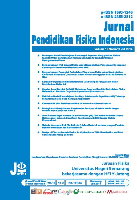
Jurnal Pendidikan Fisika Indonesia-Indonesian Journal of Physics Education
Empowering Educators with Innovative InsightsJurnal Pendidikan Fisika Indonesia-Indonesian Journal of Physics Education is a premier open-access journal dedicated to advancing research and pedagogy in the field of physics education. Published by Universitas Negeri Semarang, this journal aims to provide a platform for educators, researchers, and professionals to disseminate innovative teaching practices, empirical studies, and theoretical insights that contribute to the enhancement of physics education globally. With a commitment to accessibility since its inception in 2009, the journal is instrumental in fostering collaboration and knowledge sharing across the international physics education community. The journal not only serves as a vital resource for scholars and practitioners but also plays a significant role in shaping the future of physics teaching and learning in Indonesia and beyond. Researchers and educators are encouraged to submit their manuscripts to engage with the latest trends and research in this dynamic field.

Technology Knowledge and Learning
Advancing the Intersection of Technology and EducationTechnology Knowledge and Learning, published by SPRINGER, stands as a pivotal platform in the realms of computational theory, computer science, education, and human-computer interaction. With an impressive impact factor reflecting its reputation, this journal has consistently ranked in the Q1 quartile across multiple categories as of 2023, including Computational Theory and Mathematics, Education, and Engineering. Spanning a timeline from 2011 to 2024, it serves as an essential resource for those engaged in exploring the intersections of technology, pedagogy, and knowledge transfer, thereby facilitating advancements in both theory and practical applications. Although it is not an open-access journal, the rigorous peer-review process ensures that only the highest quality research contributes to its esteemed reputation. By providing a platform for innovative research and discussions, Technology Knowledge and Learning plays a crucial role in shaping the future of technological education and applications, making it an invaluable resource for researchers, professionals, and students alike, seeking to stay at the forefront of this dynamic field.

International Journal for Technology in Mathematics Education
Enhancing teaching methodologies for a digital age.International Journal for Technology in Mathematics Education (ISSN: 1744-2710, E-ISSN: 2045-2519) is a pioneering platform published by Research Information Ltd that focuses on the interplay between technology and mathematics education. Established to bridge the gap between pedagogical practices and technological advancements, this journal connects researchers, educators, and practitioners in a bid to enhance teaching methodologies and optimize learning outcomes in mathematics. Although its coverage in Scopus was discontinued after 2020, it continues to be a vital resource for those interested in the integration of technology into educational settings. With its significant emphasis on interdisciplinary approaches, the journal has garnered attention in the realms of social sciences and computer science, with Scopus rankings reflecting its niche contributions. This journal is crucial for professionals aiming to explore innovative techniques in mathematics education, making it an invaluable addition to any academic library.
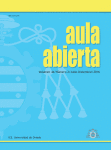
Aula Abierta
Empowering educators with cutting-edge insights.Aula Abierta is a prestigious academic journal published by the UNIV OVIEDO, INST CIENCIAS EDUCACION, specializing in the field of education. With an ISSN of 0210-2773 and an E-ISSN of 2341-2313, Aula Abierta has established itself as a vital platform for fostering scholarly discussions and disseminating innovative research in education. Ranking in the Q2 category for education in 2023, the journal is positioned within the 49th percentile of education research, as per Scopus rankings. Its scope encompasses a wide range of educational topics and methodologies, promoting accessibility and knowledge sharing among educators, researchers, and students alike. Situated in Spain, Aula Abierta plays an important role in advancing educational practices and theories for both local and international audiences. The journal's commitment to high-quality research makes it an essential resource for those looking to contribute to or expand their understanding of contemporary educational challenges and practices.